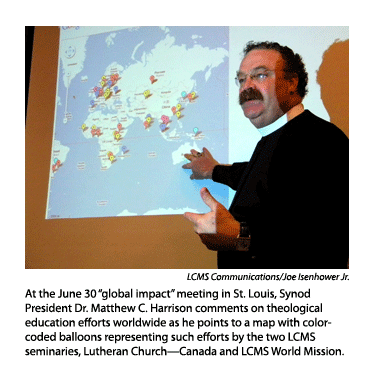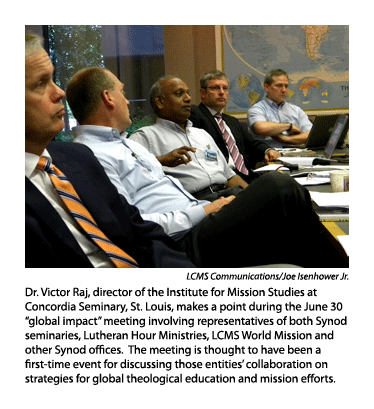How the Synod can marshal its theological education and mission efforts for the greatest impact worldwide was the topic for a first-time meeting June 30 of 16 representatives from the two LCMS seminaries, Lutheran Hour Ministries,
Details of the meeting at the LCMS International Center are covered in a June 30 WITNESS, MERCY, LIFE TOGETHER blog post from the president’s office. To read that post, click here.
“To the best of our knowledge, this is the first time an event such as this has been held with people from the International Center … along with both seminaries … and Lutheran Hour Ministries, gathered together to forge a collaborative strategy towards … global theological education and mission efforts,” Dr. Albert C. Collver Jr., the Synod’s director of Church Relations — assistant to the president, wrote for that blog post.
The group plans to hold future meetings as it continues to aim toward the goal of marshaling the Synod’s theological education and mission efforts for the greatest impact globally.
The idea for such meetings grew out of a visit Synod President Dr. Matthew C. Harrison made several months ago to a faculty forum at Concordia Seminary, St. Louis. Responding to Harrison’s vision to “rock the Lutheran world,” Professor of Exegetical Theology Dr. Paul Raabe sugges
“Now is the moment for the Missouri Synod to go on the offensive and forge ahead worldwide in mission and theological education,” Harrison told the group.
For the meeting, each entity represented, along with Lutheran Church-Canada, provided a detailed history and listing of its mission work and theological education efforts around the world. Those reports were compiled into a 40-page document that included maps with color-coded balloons indicating where each component of those efforts is located.
The maps — also displayed on the “Witness, Mercy, Life Together” page — served as a springboard for discussion of how to strengthen and multiply the work worldwide. The group also discussed working toward policies for “guiding principles for collaboration and for stewardship of resources.”
“All that has occurred in mission and theological education in the past is significant,” Harrison told the group. “But now, we have to look forward to a common strategy — for reaching out worldwide together with the pure Word of God — perhaps doing some things we’ve never done before.”
Collver and Dr. David Birner, interim co-director of the LCMS Office of International Mission, provided an overview of LCMS and Lutheran Church-Canada theological education work around the world, followed by reports by representatives of the two seminaries and Dr. Douglas L. Rutt, international director for Lutheran Hour Ministries (LHM).
Birner spoke of LCMS World Mission’s “historic and ongoing mission strategy of establishing sustainable church bodies that are equipped to proclaim the Gospel from generation to generation.”
“I agree with President Harrison, that this is the time to be on the offensive, to be at work where we are,” Birner said during the meeting. “And if we forge ahead with shared vision, we will not only build pillars for new Christians and congregations, but also new mission starts around the world.”
Several others agreed with Birner about the need to strengthen the capacity of LCMS partner churches and their seminaries for mission and education, in order to have the greatest impact.
“The opportunity is enormous, considering the capacity for mission and theological education around this table,” said Dr. Lawrence R. Rast Jr., acting president of Concordia Theological Seminary in Fort Wayne, Ind.
“We could probably double the faculty at both seminaries and keep them all busy conducting theological education around the world,” said Concordia Seminary, St. Louis, President Dr. Dale A. Meyer. “The opportunities are extraordinary.”
“Worldwide continuing theological education is a huge need,” said Dr. Timothy Quill, director of Theological Education and Missionary Recruitment with the Synod’s International Mission office and associate professor for Pastoral Ministry and Missions and dean of International Studies at the Fort Wayne seminary. “Between our two seminaries, we can’t begin to fill all the requests. There’s more than enough work for everybody.”
Rutt noted that LHM works directly in 31 world locations — not in theological education, but in outreach and equipping laypeople through Bible correspondence and evangelism-training seminars.
Dr. Glen Thomas, executive director of pastoral education for the Synod, served as moderator for a discussion of work toward the policies that those involved in the meeting could agree on as guiding principles for exercising their global mission and theological education capacity. A committee of the group will compile participants’ policy suggestions.
Also during that first meeting, discussion focused on a funding challenge presented in the May 2011 special “Blessings, Gifts, Challenges” edition of The Lutheran Witness. That challenge called on the Synod to raise $250,000 for international student seminary education.
Participants expressed appreciation for the June 30 meeting.
After that meeting Dr. Andrew Bartelt, vice-president for academic affairs at Concordia Seminary, St. Louis, told Reporter, “We appreciate and support the cooperation and strategic thinking about good stewardship of our resources toward the extraordinary opportunities of our Lord’s global mission. This meeting has been very helpful in bringing partners together.”
“While there is much work still to be done, details to be completed and more input sought from the seminaries and from partner churches, today was a good start,” Collver concluded in the blog post.
Posted July 8, 2011/Updated July 27, 2011

